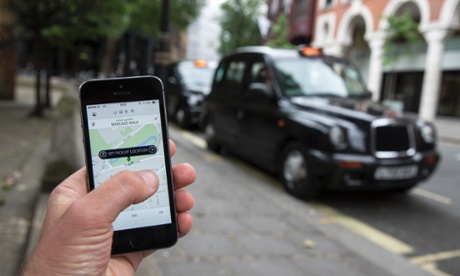The London mayor’s interventions in his transport body’s dispute with the capital’s black cab drivers have had a rather political flavour

A black cab meets an Uber mobile app. Photograph: Oli Scarff/Getty Images
The continuing row between Transport for London (TfL) and the Licensed Taxi Drivers Association (LTDA) about the private hire firm Uber and its fare-calculating booking app has been notable for many things, not least as an example of how digital innovation can disrupt established economic models overnight and reduce black-and-white law to a grey area. Also of significance has been the input into the debate of Boris Johnson, theincreasingly part-time mayor of London and “star player” in the Conservative Party’s general election campaign.
While his transport agency has been stoutly defending its decision in 2012 to allow Uber to operate on the grounds that it had no legal grounds to do otherwise, Johnson has publicly appeared to take the cabbies’ side. The LTDA contends that the Uber app should be defined as a taximeter and therefore deemed illegal. Johnson recently told LBC’s Nick Ferrari that in his view the legal advice to the contrary that he and TfL had been given was incorrect. This was not an isolated incident. As a mayoral spokesperson says: “The mayor has expressed his personal opinion about Uber’s mobile app on a number of occasions.” Johnson also expressed his personal opinion of Uber in general for Ferrari, calling the company “excessively bumptious”.
Johnson’s interventions on this issue include an unusual one at last month’s meeting of the TfL board, which he chairs. After re-stating his view that “the black cab trade has a point” about the Uber app being a meter and again expressing disapproval of Uber’s “attitude”, he declared the meeting temporarily adjourned in order to get round legislation precluding the LTDA’s Bob Oddy, a member of the board, from saying his piece on the affair.
The webcast of the meeting, which continued throughout, shows Oddy making the LTDA’s angry claim that it had alerted TfL to the Uber issue in summer 2012 and had only proceeded with its own private prosecutions against Uber drivers because TfL had not previously sought to clarify the legal position regarding the contentious app through the High Court, as itsubsequently has. TfL commissioner Sir Peter Hendy, who was also at the meeting, said Oddy’s assertion was “not true”.
It all got rather tense and dense and Johnson concluded, as on other occasions, that the most important thing, of course, was for the courts to sort out once and for all if the Uber app is or is not a taximeter (things have, thankfully, since moved in that direction just a bit). But, once again, he’d got his sympathy for the black cab trade across.
Why has Johnson been at such pains to do this? Why has he not followed his gut political instincts by warming to what other Conservatives regard as the dynamic, entrepreneurial flair of Uber and telling London cabbies, with their great Knowledge and proud history, to buck up and modernise or perish at the hands of superior market competition?
A clue may lie in the annals of the 2008 mayoral election campaign that brought Johnson to power in City Hall. Many London cabbies, eager to see Ken Livingstone removed, took to providing passengers with receiptsbearing the legend “Back Boris”, adding presence and momentum – not to mention an influential section of London public opinion – to his successful push for City Hall. That push was directed, of course, by Lynton Crosby, the aggressive right-wing strategist now running the Tories’ national assault on Number 10. Well, fancy that.
Johnson may, however, have his work cut out if he’s trying to get London’s cab drivers on his and Conservatism’s side as general election hostilities intensify. At last week’s mayor’s question time he was asked about the London Assembly transport committee’s recent report on the future of the capital’s taxi and private hire services. This bemoaned the deteriorating relationship between TfL and the hire trades as a whole but also said that efforts to reform them to meet changing passenger expectations were being hampered by a “lack of mayoral strategy”. As Andrew Neather reported in his admirably clear and exhaustive piece on the dispute, Johnson “admitted to not having read the report – to jeers from watching cabbies.”
Footnote: Labour is on course to gain eight seats in the capital. Taxi!
Source: The Guardian





